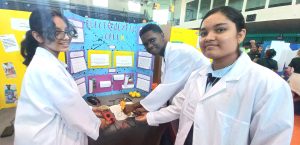Several weeks ago, three eleventh graders from the Bregado Flax Educational Centre on Virgin Gorda were chatting about their lunches when their conversation turned to creating electricity from tomatoes, potatoes and other produce.
The trio, who described themselves as conservationists, then brainstormed what they termed a “lightbulb idea” for a project. After conducting research, they learned how to connect electrodes to vegetables to produce small amounts of electricity. Then they measured the various currents with a voltmeter.
“We used quite a few, but the lemon gave us the most in terms of output because it had more citric acid,” said group member Rhiann Ramlall. Her colleague added, “We hope to get out the idea in the public so that people can think about finding alternative ways to create energy.”

The result of their work was a project titled “The Electrolytic Cell,” which they exhibited at the National Science Fair on Monday and Tuesday at the Multi-purpose Sports Complex. The fair kicked off Education Week 2023, which is being celebrated this week under the theme “Virgin Islands Education: Moving Full S.T.E.A.M. Ahead.”
The acronym — which stands for Science, Technology, Engineering, Arts and Mathematics — has been a recent focus for the education system, Education, Youth Affairs and Sports Minister Sharie de Castro said last Thursday in the House of Assembly.
Science fair
This year, 194 students from 19 public and private primary schools took part in the science fair, showcasing 89 projects, according to education officials. Meanwhile, 137 students from four public and private high schools displayed 84 projects. The high schoolers entered in one of three categories: scientific experiment (which included the electricity project); scientific models; and visual arts. In the third category, the students were required to make scientific drawings, paintings or sculptures.
Primary schoolers were tasked with creating models and undertaking science experiments. Three Grade Six girls from Joyce Samuel Primary School created a water filtration system using sand, stones and a few cups of earth, which they stacked on a sieve. The students then used a device called a TDS (total dissolved solids) meter to measure the quality of the filtered water. “Our experiment proved that we can filter clean water, and this is good, because for times such as when we have hurricanes we can find ways to get clean water,” one participant explained.
The trio added that they also plan to develop other methods of filtering water, noting that the science fair gave them an opportunity to share their ideas with other students. Nearby, two girls from Cedar International School showed off two zinnia seedlings they had planted in separate containers.
Over a period of 40 days, they monitored the height of both plants, each of which received a different amount of water. “Our aim is to see which plant grew higher, and we proved our hypothesis,” explained Isla Meyers, noting that the plant that received less water grew more quickly.
Reimaging education
Other Education Week events included a discussion themed “Reimagining Education in the Virgin Islands” on Monday evening at the Eileene L. Parsons Auditorium at H. Lavity Stoutt Community College. During the session, local and regional experts discussed the way forward for education, and attendees got a chance to weigh in.
Keynote speakers included Ms. de Castro as well as DeeAnn Kentish-Rogers, Anguilla minister of education and social development; Dr. Didacus Jules, director general of the Organisation of Eastern Caribbean States; and Dr. Jonte Meyers, assistant professor of special education at Georgia State University.
Dr. Jules argued that the “immense creativity” that made Caribbean culture a global influence is being crippled by “dysfunctional education.” The solution, he added, includes enriching the learning experience in schools and fostering “motivation and a sense of purpose.” Dr. Meyers recommended engaging students in “deeper learning” to promote “content mastery” rather than shallower learning he described as “road memory.” Such work, he said, fosters intellectual curiosity and problem-solving skills.
Other events
The week also included a debate. On Wednesday morning, the Elmore Stoutt High School and the Claudia Creque Educational Centre faced off over the moot “Education without the inclusion of liberal arts is a threat to humanity.”
Other high school students competed in a speech competition at the New Testament Church of God International Worship Centre in Baughers Bay.
Activities scheduled for yesterday included a book parade and games for pre-primary students. Today, teachers are expected to bring the curtains down on the activities with the “S.T.E.A.Mazing Race” at the Queen Elizabeth II Park.